It may seem like there’s little to cheer, but these leaders and activists can show us how to keep fighting the good fight in what promises to be a challenging 2024.
The year 2023 was at once overwhelming and agonizingly predictable. The Middle East blew up. The war in Ukraine wore on. Donald Trump, despite 91 indictments, retained his claim on the soul of the Republican Party and barreled toward a 2024 rematch with Joe Biden, whose approval ratings remained in the doldrums. Republicans in Congress couldn’t get their act together, while Republicans in the states gave master classes in cruelty on issues ranging from abortion rights to immigration. So what is there to cheer? A lot. Labor’s on a winning streak, congressional progressives are writing fresh narratives on foreign and domestic policy, and a new generation of activists has, in pursuit of a cease-fire in Gaza, transformed the debate about US relations with Israel and Palestine. This year’s Nation Honor Roll celebrates the bold leaders and activists who give us hope for a better world in 2024 and beyond.
BOLD CLASS WARRIOR
Shawn Fain

Most Americans had never heard of Shawn Fain, the auto plant electrician and insurgent union activist from Kokomo, Ind., before his election in March as the president of the United Auto Workers union. They certainly know him now. Fain took the labor movement and the auto industry by storm with a tactically brilliant strike that forced General Motors, Ford, and Stellantis to agree to historic pay increases for almost 150,000 autoworkers and placed the union at the center of the fight to define the future of the rapidly electrifying industry. In so doing, Fain and his team took a once-militant union, which had been weakened by internal scandals and concessionary contracts that left workers financially struggling and deeply frustrated, and restored it as a fighting force that called out corporate power in unapologetic terms.
Accused of engaging in class warfare, Fain donned an “Eat the Rich!” T-shirt, announced that “billionaires, in my opinion, don’t have a right to exist,” and proposed to align union contracts across industries to make way for bigger, bolder strikes in the future. And the American people loved it: One poll found that support for the UAW during the strike hit 75 percent. Fain and his allies got Biden to join a union picket line—a first for a sitting president—and upended Trump’s efforts to divide the workers against one another and their own best interests. Along with Teamsters general president Sean O’Brien, whose union secured a groundbreaking UPS contract, and Association of Flight Attendants president Sara Nelson, Fain and the UAW are leading American labor into a new era of more organizing, more strikes, and more recognition. As Fain said, “Working-class people have to focus on the power that we have when we stand together, and the power we have is, when we withhold our labor, nothing’s gonna move.”
BOLD HOPE FOR THE PLANET
Rebecca Solnit and Thelma Young Lutunatabua
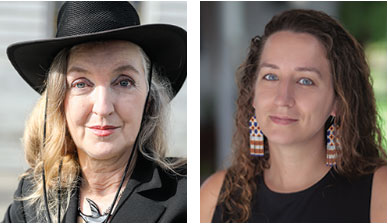
“Hope is not like a lottery ticket you can sit on the sofa and clutch, feeling lucky. Hope is an axe you break down doors with, in an emergency,” wrote essayist and activist Solnit in the 2023 book she edited with Lutunatabua, Not Too Late: Changing the Climate Story From Despair to Possibility. In a year dominated by increasingly disturbing climate news—including a string of unnatural disasters and reckless procrastination on the part of governments—Not Too Late argues, convincingly, that there is still time to save the planet. Solnit and Lutunatabua pulled together scientists, Indigenous organizers, artists, and activists from the front lines of the struggle—among them The Tyranny of Oil author Antonia Juhasz and Marshall Islands poet and activist Kathy Jetñil-Kijiner—to make the case that there is hope for a future in which human needs prevail over the fossil fuel industry’s greed. With a commitment to utilize emerging science and a faith in the resilience of people and the planet, Solnit and Lutunatabua remind us, we have the tools that are needed to demand that corporations and governments change course before it’s too late.
BOLD HISTORIAN
Rashid Khalidi

Most Americans know less than they think they do about Palestine, and that includes most members of Congress. So it was vitally important, as the violence flared, that Khalidi, the Oxford-educated Edward Said Professor of Modern Arab Studies at Columbia, stepped up to provide perspective. The Palestinian American author of The Hundred Years’ War on Palestine became a steady source of facts and incisive analysis in the aftermath of the October 7 attack on Israel by Hamas militants and the ensuing Israeli assault on Gaza. Khalidi opened up the discussion with a New York Times op-ed titled “The U.S. Should Think Twice About Israel’s Plans for Gaza”; warned on PBS that “violence is bred by occupation”; and lent his broadly respected voice to the outcry against efforts to silence dissent. Inspired by the outpouring of support for Palestinian rights in the United States and around the world, he noted, “I think there has been a shift over time in the willingness to at least consider that there is a Palestinian narrative.” Few people have done more than Khalidi to foster that shift.
BOLD HOUSE MEMBER
Cori Bush
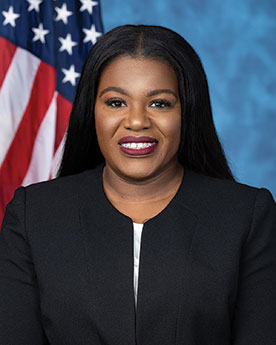
After the October 7 attack on Israel, the heartbroken Democratic representative from Missouri immediately condemned the targeting of civilians and pledged to aid constituents who had loved ones in the region. But unlike most members of Congress, Bush didn’t stop there. She called for “an immediate ceasefire and de-escalation to prevent further loss of life” and said, “Violations of human rights do not justify more violations of human rights, and a military response will only exacerbate the suffering of Palestinians and Israelis alike.”
That stance earned her a backlash—including the threat of a 2024 primary challenge that’s likely to be financed by the political arms of AIPAC and other groups that support Israeli hard-liners—but Bush remained steadfast. As Israel’s assault on Gaza intensified, she emerged as the chief sponsor of the House “Ceasefire Now” resolution calling on the Biden administration to exhaust every diplomatic tool to end the assault on Gaza—which by mid-December had cost more than 20,000 lives. Bush and the resolution’s cosponsors, such as Rashida Tlaib of Michigan and Ilhan Omar of Minnesota, were harshly criticized, often by their fellow Democrats. But they persevered, creating a congressional touchstone for the mass movement that seeks to persuade the US to stop giving right-wing Israeli Prime Minister Benjamin Netanyahu a blank check every year. “We can’t bomb our way to peace, equality, and freedom,” Bush said. “With thousands of lives lost and millions more at stake, we need a ceasefire now.”
BOLD CONSTITUTIONALIST
Jamie Raskin
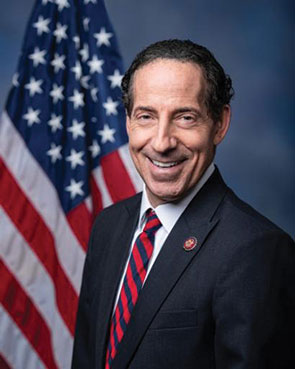
Before his election to Congress, Raskin taught constitutional law, and it shows. In a House chamber where everyone talks about the Constitution but too few respect it, Raskin brought knowledge and vitally needed insight to the 2023 debates about the right to dissent and the folly of the GOP scheming to impeach President Biden. Passionate, outspoken, and good-humored, the Maryland Democrat challenged the Republican crusaders seeking to impeach Biden by highlighting the fact that their arguments failed to meet baseline constitutional standards for removing a president. “If the Republicans had a smoking gun, or even a dripping water pistol, they would be presenting it today,” Raskin said, “but they’ve got nothing on Joe Biden.”
Raskin’s most powerful moment in 2023 came when he delivered a robust First Amendment argument against censuring Tlaib—the only Palestinian American member of Congress—for her criticisms of the Israeli assault on Gaza, which she labeled “the genocide of the Palestinian people.” Recalling the discrimination his grandfather faced as the only Jewish member of the Minnesota Legislature in the 1930s, Raskin linked his defense of Tlaib to his status as a “Jewish American who supports the Constitution and the Jewish Democratic State [of Israel] and hates the antisemitic tyrants and terrorists of the world.” The censure, he said, was “about one thing and one thing only: the punishment of speech.” Raskin warned that the resolution “degrades our Constitution” and declared, “A secure constitutional Republic which actively protects the freedom of dissenting speech to allow for serious debate shows its strength—not its weakness.”
BOLD SENATOR
Jeff Merkley
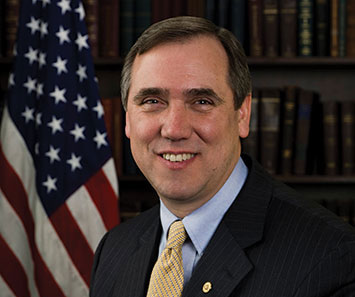
The Oregon Democrat isn’t the best-known, or the loudest, or the most powerful US senator. Rather, he has made his mark as a policy wonk who is passionate about economic, racial, and social justice, who defends immigrants, seeks to save the planet, and champions diplomacy and cooperation on the international stage. Merkley takes the War Powers Act seriously and crosses party lines to enforce it, as he did in December when he backed Kentucky Republican Rand Paul’s resolution to withdraw US troops from Syria. And Merkley was one of the first members of the Senate to call for a cease-fire in Gaza. Closer to home, he has repeatedly visited the US-Mexican border as an advocate for humane and responsible approaches to immigration—including paths to citizenship for undocumented people.
Popular
“swipe left below to view more authors”Swipe →
Merkley regularly focuses on issues that the Senate should be talking about. In 2023, he raised the alarm about the deployment of facial recognition technology at airport security checkpoints, warning that the Transportation Security Administration is “pushing us closer to a surveillance state, collecting data that violates our right to privacy and can be abused.” And along with Democratic Representative Nikema Williams of Georgia, he organized a push to remove the notorious section of the Constitution’s 13th Amendment that creates an exception to the abolition of slavery when it is employed “as a punishment for crime whereof the party shall have been duly convicted.” That, said Merkley, is “a gaping and absolutely unacceptable loophole.” He’s determined to close it.
BOLD LEGISLATORS
Justin J. Pearson, Justin Jones, and Gloria Johnson

In April, the nation’s attention was focused on the Tennessee Legislature, where two Black Democrats, Justin Pearson and Justin Jones, were expelled for leading a floor protest against legislative inaction on gun violence after a deadly school shooting in Nashville. An attempt to expel Gloria Johnson, who is white, narrowly failed. The move by the overwhelmingly white male Republican legislative leaders to punish the trio made the red-state Democrats heroes among advocates of gun control. Johnson is now running for the US Senate, and Pearson and Jones were both reelected in landslides. Pearson headed back to the state Capitol with a message: “This is the democracy that is going to transform a broken nation and a broken state into the place that God calls for it to be. This is the democracy that is going to lift up the victims of gun violence instead of supporting the NRA and the gun lobbyists.”
BOLD VOTERS
Young Supporters of Abortion Rights

After the US Supreme Court’s Dobbs decision, some pollsters and pundits suggested that the abortion issue would not remain politically potent for all that long. Wrong! Abortion was a central concern for voters in 2023, especially young ones, whose support is critical for Democrats. Control of the Wisconsin Supreme Court flipped to progressives when Janet Protasiewicz, an unflinching supporter of abortion rights, won a seat as a justice. Kentucky Governor Andy Beshear credited a pro-choice message with helping him win reelection, as did Virginia Democrats, who took full control of their state Legislature. And Ohio voters added abortion rights protections to their state Constitution. Anti-abortion Republicans had “nowhere to hide” in 2023, said former Planned Parenthood CEO Cecile Richards. That will remain the case in 2024.
BOLD SCHOOL BOARD MEMBER
Allison Spillman

Before Moms for Liberty got derailed by a Florida sex scandal, the group was sowing fear among the nation’s educators with ludicrous demands for book bans by school districts and schemes to take over local school boards. Ultimately, the “Moms” banned way more books than they managed to elect candidates. Throughout the country in 2023, voters chose school board members who supported academic freedom. Allison Spillman was one of them. Her opponent in a Virginia school board election in November, Meg Scalia Bryce, was not officially endorsed by Moms for Liberty. But Bryce followed in the political footsteps of her right-wing father, the late Supreme Court justice Antonin Scalia. She raised big money for the school board race in Albermarle County, which includes Charlottesville, the city that was rocked by white supremacist violence in 2017. Yet Spillman, who relied on small-donor money, beat Bryce by roughly 10,000 votes.
A mother of five—among them a child who is transgender, another who is on the autism spectrum, and two who are adopted—Spillman was an active parent in her kids’ public schools, while Bryce sent hers to private schools. Bryce came across as a country-club conservative, outwardly polite but ready to deny the existence of systemic racism and insist that curbing the rights of transgender students was compassionate. As a candidate, Spillman got texts from parents saying, “Thanks for standing up for our kids. Thanks for standing up against racists and homophobes.” She’ll stay focused on those issues as a board member, along with pushing to secure collective bargaining rights for teachers, who, she said, “deserve a seat at the table.” Joan Walsh
BOLD ACTIVISTS
Beth Miller, Abbas Alawieh, and Eva Borgwardt

Among progressives, the initial response to the war in Gaza was clumsy and confused. But three leaders emerged to steer the ship: Beth Miller, the political director of Jewish Voice for Peace; Abbas Alawieh, a former chief of staff to Cori Bush; and Eva Borgwardt, the political director of IfNotNow. These millennial organizers joined forces around a shared conviction: “We are anti-war, and we are for a ceasefire.” They met with Bush and Rashida Tlaib and helped craft the “Ceasefire Now” resolution, which became a vital organizing tool with which to pressure President Biden and Congress. Miller, Alawieh, and Borgwardt led with a firm yet patient grace. They responded to mudslinging and hostility with clear demands for the release of all hostages and prisoners of war and a principled opposition to the harming of any human life, echoing the second clause of the resolution, which states that “all human life is precious, and the targeting of civilians, no matter their faith or ethnicity, is a violation of international humanitarian law.”
Miller and Borgwardt also organized the largest Jewish-led protests for both a cease-fire and an end to the Israeli occupation in US history. Alawieh, who is Lebanese American, became the connective tissue between movement organizations and Congress, providing hope to Capitol Hill staffers who were frustrated by the silence of the world’s most powerful legislature on the killing of Palestinian civilians. The trio’s work inspired millions of Americans, especially young people, to speak out against the war, even in the face of a backlash from college administrators, Republican governors, and groups like AIPAC and the ADL. Miller, Alawieh, and Borgwardt gave voice to a responsible and strategic left, providing a clear demand that appealed to the majority of Americans. Against all odds, they helped build a new peace movement. Their courageous and visionary work teaches us all a valuable lesson: Solidarity across difference doesn’t just happen; it is forged. Waleed Shahid
BOLD JOURNALISM
Haaretz

The oldest continuously published newspaper in Israel, Haaretz has a history of speaking truth to power. It did so early in 2023, by covering the mass protests against Benjamin Netanyahu’s scheme to overhaul the Israeli judicial system and undermine checks on his far-right government. Since the October 7 Hamas attack, the newspaper has reported and editorialized with rigor and bravery, making it essential reading for Israelis—and for Americans who seek a clearer sense of what’s happening in a country the US supports with massive military aid and diplomatic cover at the United Nations.
In its first editorial after the attack, Haaretz declared: “Netanyahu Bears Responsibility for This Israel-Gaza War.” The newspaper has continued to call out the prime minister for “inciting and sowing destruction.” (An early November editorial was headlined “Just Leave, Netanyahu.”) Its coverage of the war in Gaza so enraged the Israeli government that Netanyahu’s communications minister threatened to penalize the paper. The editors weren’t intimidated. Haaretz is not perfect, by any means. But it is necessary, offering a perspective that’s too frequently missing from major media in the US—and that the White House should pay more attention to. Katrina vanden Heuvel
BOLD THINKER, BOLD PODCASTER
Beatrice Adler-Bolton

Beatrice Adler-Bolton identifies as a “blind/low vision and chronically ill artist and author,” and her 2022 book with Artie Vierkant, Health Communism: A Surplus Manifesto, “argues for a new global left politics aimed at severing the ties between capital and health.” That would be more than enough. But she also cohosts the absolutely essential Death Panel podcast with Vierkant, Phil Rocco, Jules Gill-Peterson, and Abby Cartus. In my view, it is by far the most important chronicle of the pandemic era. Adler-Bolton isn’t that well-known, but she should be. I’ve been so hungry for a new vision for health for so long, and she provides it in her writing and in the conversations with the activists, writers, and artists who join her on the podcast. Gregg Gonsalves
BOLD ROCKER
Tom Morello
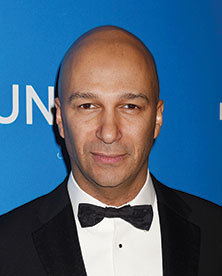
Tom Morello has spoken powerfully with his guitar as a longtime member of Rage Against the Machine. But the fierce critic of imperialism and injustice spoke a radical language that is all too rare in American public life in November, when he accepted Rage’s induction into the Rock & Roll Hall of Fame. As Morello told the crowd: “Fans often ask, ‘But what can I do?’ Well, let’s start with these three things: One, dream big and don’t settle. Two, aim for the world you really want without compromise or apology. And, three, don’t wait for us. Rage is not here, but you are. The job we set out to do is not over. Now you are the ones that must testify. If you’ve got a boss, join a union. If you’re a student, start an underground paper. If you’re an anarchist, throw a brick. If you’re a soldier or a cop, follow your conscience, not your orders. If you’re bummed out you didn’t get to see Rage Against the Machine, then form your own band, and let’s hear what you have to say. If you’re a human being, stand up for your planet before it’s too late.”


